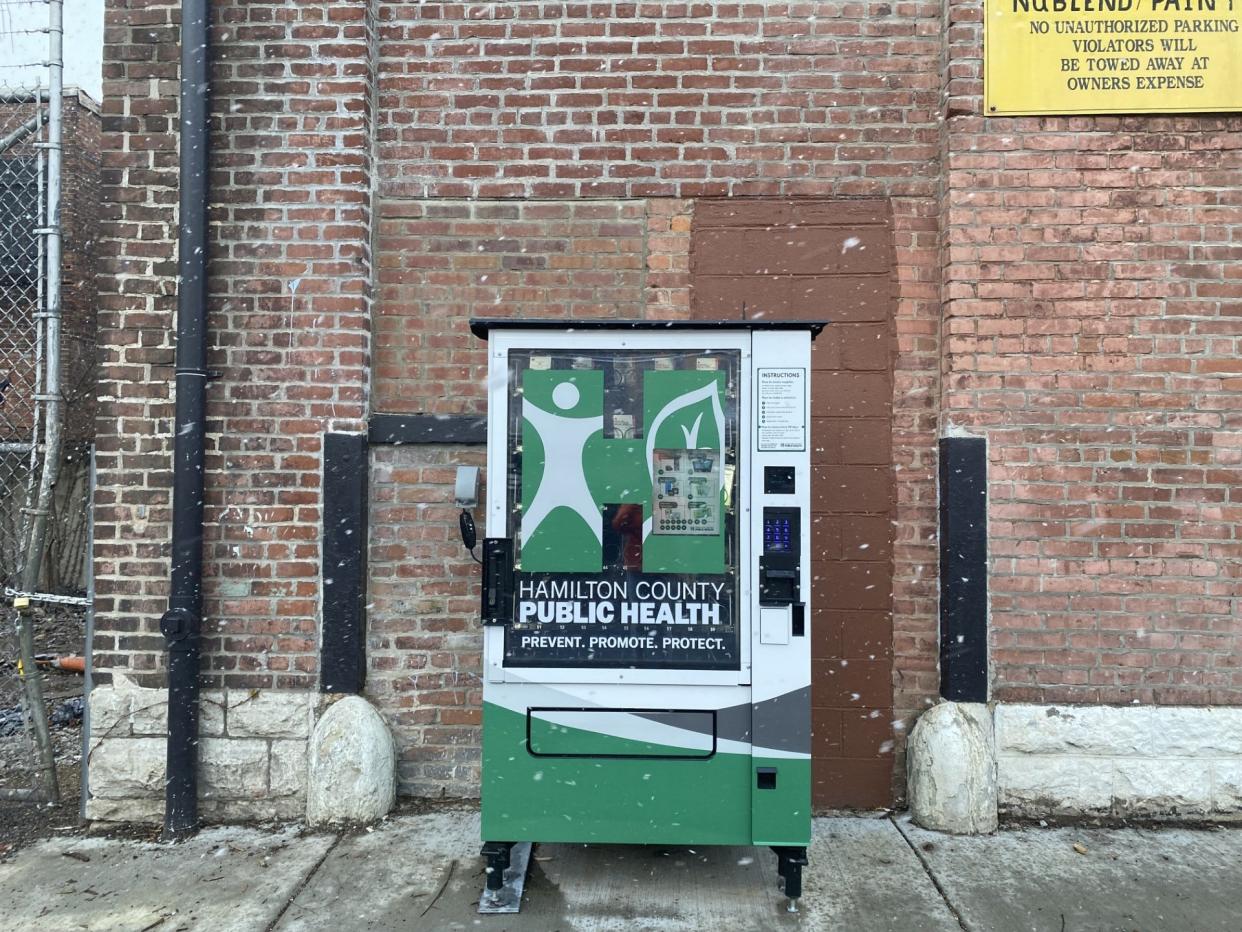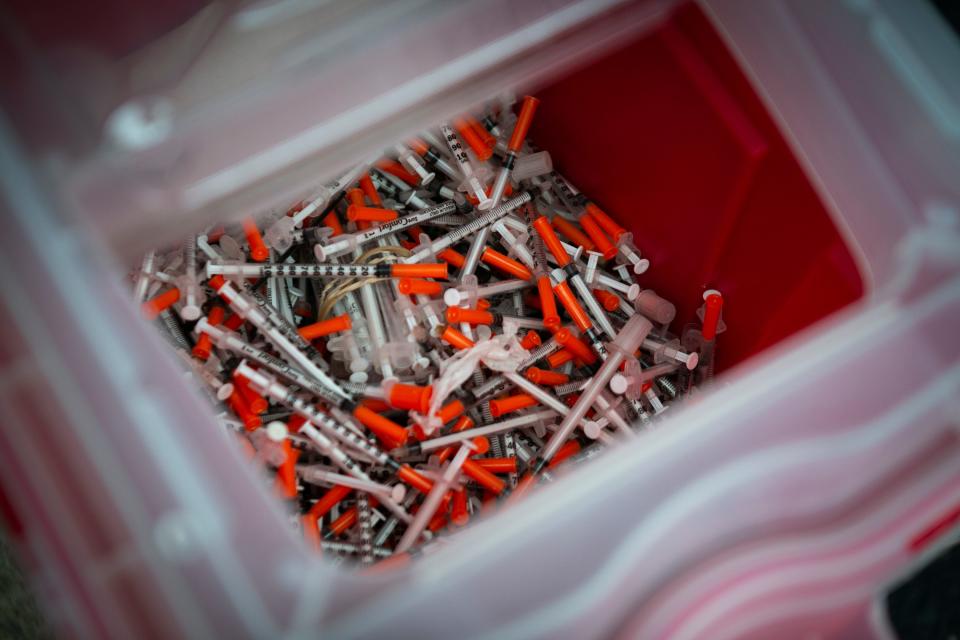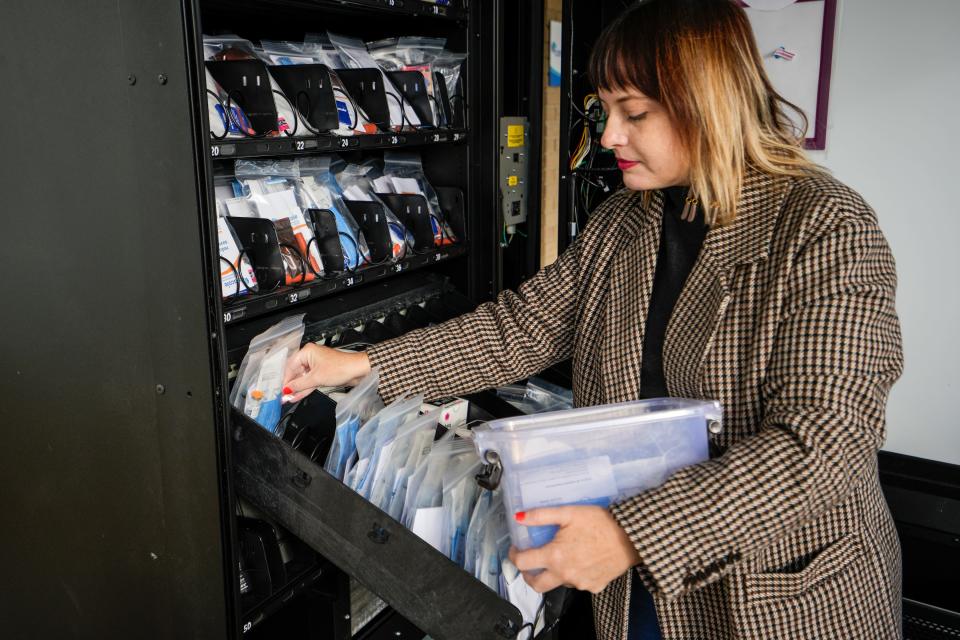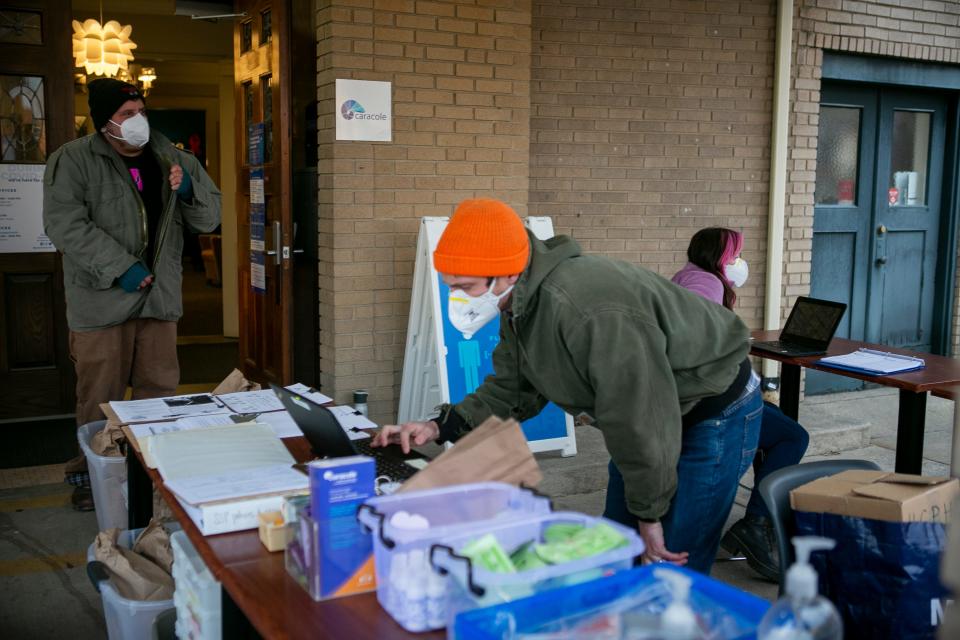Drugs, sex and harm reduction: New vending machines could reduce spread of HIV

Tucked away in an alley between the NeighborHub Integrated Care Clinic and an elevated parking lot in Over-the-Rhine is a green vending machine emblazoned with a leaf icon.
The foot traffic in the alley is sparse, but the machine is available to anyone 24-7. It is stocked with potentially lifesaving supplies: naloxone spray, fentanyl test strips, and condoms. Call a confidential number and you’ll get the access code to get the items free.
In mid-December, Hamilton County Public Health installed two of these new vending machines (the other is Downtown at Fire Station District 3), designed to meet people who may not be able to get to, or feel comfortable going to, other harm reduction sites.
The supplies in both machines echo the mantra nationwide to curb the opioid epidemic by providing naloxone. They address the need to make people aware of deadly fentanyl in their drugs by stocking detection strips. And they're a reminder that people who use drugs, even if they use sterile syringes, need protection from sexually transmitted infections like HIV.
“Safer sex supplies are incredibly important tools to include alongside safer drug use equipment for any robust harm reduction effort,” said Billy Golden, a specialist on the Harm Reduction Ohio board. He was among the first people to hand out safe supplies with The Cincinnati Exchange Project, established by a small group in 2014.
“Substance use may affect a person’s sexual behaviors in ways that lead them to engage in riskier sexual behavior," Golden explained.
Most harm reduction strategies began with jump in HIV in Cincinnati region

Harm reduction in Hamilton County started with the group Golden joined, led by a University of Cincinnati infectious disease expert. The minimally staffed, low-funded Cincinnati Exchange Project provided sterile syringes to people who used drugs. It was an effort to keep people safe from HIV and hepatitis C – two infections that are contagious and more prevalent in people who inject drugs
Four years later, in 2018, as HIV cases grew in the region along with the opioid epidemic, Hamilton County Public Health took up the exchange, funding and renaming it. Northern Kentucky Health Department had already started its safer drug use services after an uptick in HIV and hepatitis there.
Hamilton County Public Health's mobile safe supplies van, which visits several neighborhoods, remains key to providing safer drug use and safer sex supplies, as well. The HIV rate has dropped over the years since then.
Harm reduction vending model in Ohio started with Cincinnati neighborhood machine

The first harm reduction vending machine in Ohio was placed in Northside in 2021. Caracole, the Cincinnati region’s nonprofit devoted to fighting HIV and AIDS, operates the machine. In its first six months, it dispensed 743 safe sex kits and 680 pregnancy tests. It was credited with saving more than 600 people with naloxone.
Caracole's education staff helped field calls from across the country, including in Ohio, from other harm reduction groups and public health agencies that wanted to emulate the effort.
Research about Caracole's effort published in the Journal of the American Pharmacists Association in December 2022 concluded the vending machine strategy worked, noting that the machine "led to an increased accessibility of harm reduction products and services." Its placement also coincided with a drop in overdose deaths and HIV, although it was just one of many new services and programs fighting the epidemic.
More: A vending machine in Northside helped to reverse 600 ODs. Here's why it's a national model
HIV climbs nationally among people who inject drugs, data show

People who inject drugs made up 8% of the 32,100 estimated new HIV cases nationally in 2021, the latest year the data is available. Between 2017 and 2021, the number of HIV cases among people who inject drugs increased 4% in the country, according to the U.S. Department of Health and Human Services.
In 2021 locally, 122 people were newly diagnosed with HIV in Cincinnati, according to data from Emory University’s Rollins School of Public Health. Among men, injection drug use contributed to 7% of the cases. In women, injecting drugs contributed to 19% of HIV cases. No data was available for gender-nonconforming people.
Harm reduction expert: Lowering barriers to safe supplies 'vital' for stigmatized people
Harm reduction's mission is to provide safe spaces for people who use drugs and help them stay healthy. The sites' staffs establish relationships with clients and educate people but do not push them to change their lives. For those who decide to do so, the staff provides safe transitions to treatment and other services in the community.
People who use drugs are often unable to afford safer sex supplies. They have limited access to safer drug-use supplies, Golden said. And some struggle to get to harm reduction sites, which often operate for a few hours a week on specific days.
It's especially important to provide the services to people who often face stigma, including sex workers, Black and brown people, those who are gender-nonconforming or transgender, and men who have sex with men, he said.
More: The people who care: How harm reduction strategies for those who use drugs bloomed in the region
"Offering low barrier and anonymous access to safer supplies," Golden said, "is vital health equity for marginalized people."
This article originally appeared on Cincinnati Enquirer: HIV prevention: condoms, naloxone available in Cincy vending machines

